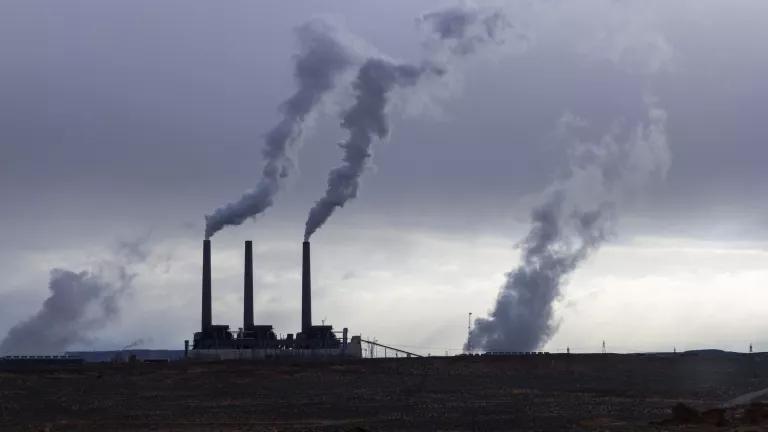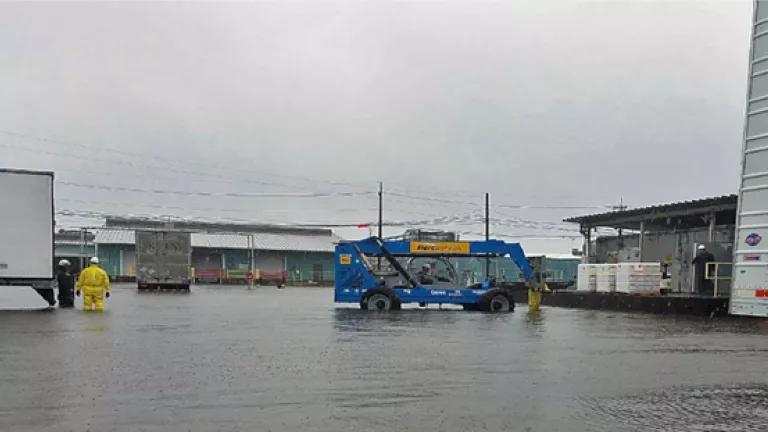EPA: Say No to Burning Plastic AKA “Chemical Recycling”
The Biden administration must stand by its commitments to safeguard the public from toxic chemicals and prioritize protection of communities already overburdened by toxic pollution.
Q: Should EPA and the Biden Administration continue the Trump administration’s support for the widespread burning of plastic waste by the chemical industry? A: Of course not! The Trump administration took several steps to promote and expand the chemical industry’s ability to practice what it calls “chemical recycling” or “advanced recycling”—which are their favored euphemisms for turning plastic into materials that are burned.
Plastics under the Biden Administration
The Biden administration and EPA Administrator Michael Regan have promised to be different, focusing their agenda on restoring scientific integrity and centering environmental justice in federal decision-making. If the Administration is serious about these commitments, it must reject the chemical industry’s ongoing efforts to weaken health protective safeguards and win federal endorsement for “chemical recycling.”
Burning plastic is not recycling, and certainly not the solution
The entire world has been horrified by the graphic evidence of plastic waste and its widespread impacts of filling our oceans, polluting our rivers, contaminating food and drinking water with microplastic, overwhelming poor countries with mounds of plastic trash (largely exported from richer countries) and killing wildlife. Widespread burning of plastic is the chemical industry’s offered “solution” to the global plastic waste crisis that the industry itself has created. But actual recycling recovers materials after use and returns them to the manufacturing cycle, where they are used to make new products, giving those materials another life as part of a circular economy. Processes like incineration or “chemical recycling” typically use plastic materials to generate a limited amount of energy in a one-time process, destroying them rather than giving them another material use.
The solutions to the plastic crisis lie in making and using less plastic, and replacing needed uses with non-toxic renewable, reusable, compostable, and/or recyclable and recycled materials. While the solution primarily needs to be addressed at the level of large-scale industrial manufacturing and use, consumers looking to support the effort can push for systemic change, starting with support for restrictions on the manufacture and use of single-use plastic.
Needless to say, the “less plastic, better materials” solution that will benefit the planet and its inhabitants is not being embraced by the chemical industry that makes plastic. While the chemical industry continually pumps out propaganda posing as a willing “partner” in efforts to overcome the plastic waste crisis, in reality the production of plastic is projected to more than double by 2050, to 756 million pounds annually. The industry has adopted its rhetoric around “chemical recycling” as a cynical cover for its plans to massively increase plastic production. “Chemical recycling” is a misnomer, since it isn’t actually recycling, and instead primarily makes materials that will be burned, creating climate and toxic pollution along the way in communities that are already disproportionately burdened while doing nothing to reduce the production of new plastic.
Recent EPA activity on plastics
The industry-created “solution” of so-called “chemical/advanced recycling” was embraced by the Trump administration, which announced a “partnership” between the Department of Energy and the chemical manufacturers’ trade association, the American Chemistry Council to develop “advanced recycling technologies including plastic-to-energy conversion.” Last August, the Trump EPA proposed a change to the EPA’s long-standing rules for regulating toxic emissions from incinerators under the Clean Air Act. The Trump proposal would have changed the definition of “incineration” to exclude incineration technologies that the chemical industry has been focused on deploying for “chemical recycling.” Earthjustice and Sierra Club submitted excellent comments opposing the proposed rule change.
Current EPA administrator Michael Regan has asked for comments on whether two combustion technologies—pyrolysis and gasification—should have to meet the same standards as other incinerators, or be exempted from regulation and allowed to emit as much pollution as they like, without controlling it, monitoring it, or reporting it to the public. The deadline for responding is December 23. The Biden administration must take this opportunity to reject the Trump proposal and recognize that both pyrolysis and gasification technologies, as well as other methods of combusting waste, are incinerators that need to be regulated to protect public health and the environment.
Meanwhile, the EPA recently finalized revisions to its National Recycling Strategy originally proposed by the Trump administration last October. The revised National Recycling Strategy opened the door a crack for endorsing “chemical recycling” as a viable strategy, saying “All options, including chemical recycling, should be discussed when considering methods for sustainably managing materials. Therefore, chemical recycling is part of the scope of this strategy and further discussion is welcome.” Chemical recycling had not been included in the Trump administration’s draft National Recycling Strategy; this is a place where the new Administration appears to be moving backwards and favoring the chemical industry over its stated commitments to environmental health and justice. Our research indicates that “chemical recycling” does not belong in the category of sustainable material management methods.
Real solutions
Fortunately, a more appropriate solution—one that won’t increase toxic pollution and harm communities—has been brought to the table: the Presidential Plastics Action Plan (PPAP), a roadmap to addressing the plastic waste crisis without adopting the plastic industry’s false solutions, which has garnered more than 500 supporting organizations. On the legislative side, there is the Break Free from Plastic Pollution Act, which will take a number of critical steps for solving the plastic waste crisis, including curtailing many of the single-use plastics that are a major source of the problem, and increasing the amount of recycled content in products. It will also exclude “chemical recycling” from the definition of recycling.
EPA and the Biden administration should reject the chemical industry’s Orwellian efforts to rebrand burning plastic as “recycling” and abandon such efforts by the previous administration—including the proposed change to the definition of incineration and the Department of Energy’s “partnership” with the plastics industry. These industry-friendly policies of the last administration will not help solve the plastic pollution crisis; instead, they will make the ongoing problems of plastic waste and toxic pollution worse, particularly in overburdened communities the Biden administration has vowed to protect.




